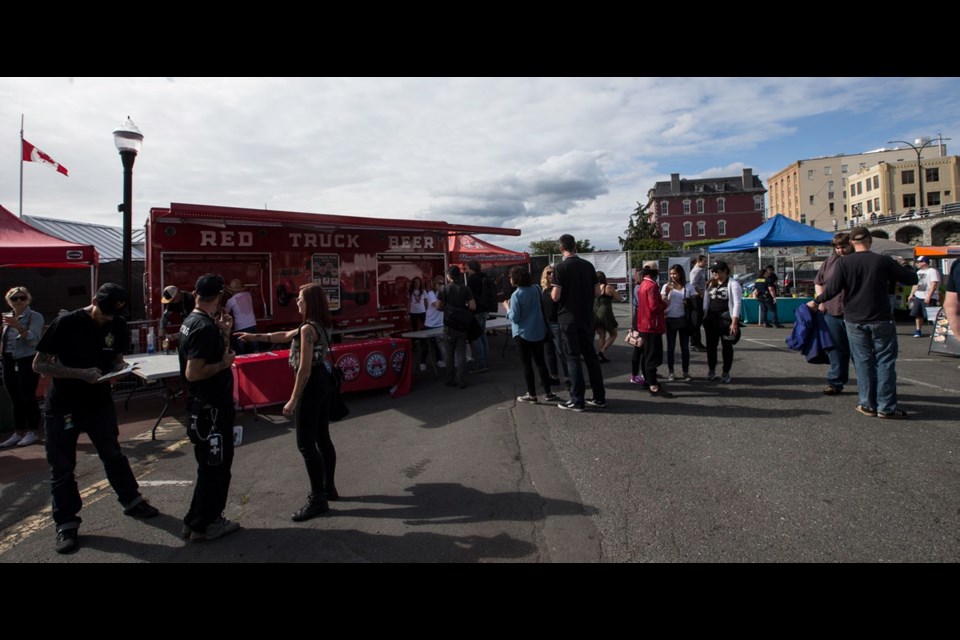When the lead singer for Mexico City’s Out of Control Army punctuated the band’s brassy intro with “Are you ready to ska?” at Ship Point Wednesday afternoon, it was a question he really didn’t have to ask.
What the crowd assembled to kick off Victoria’s 18th annual Ska and Reggae Festival initially lacked in size, it more than made up for in enthusiasm, and these music lovers were clearly ready for some ska action.
By the time downtown’s afternoon rush hour began to subside, the growing crowd had another reason to smile as clouds parted and the sun came out, as if on cue.
The sunshine seemed to validate Victoria city councillor and ska lover Jeremy Loveday’s observation that for many, himself lincluded, the festival “marks the true arrival of summer” each year.
Appearances by legendary soul sensation Booker T. Jones, Jamaica’s Keith and Tex and New Zealand’s The Black Seeds were among highlights of this year’s festival. And it’s not over yet.
It wraps up at 9 tonight at Ship Point after an all-ages finale starting at 2 p.m. that features Vancouver’s Roots Roundup, Victoria’s Dope Soda and San Francisco’s Rusty Zinn.
“Our festival is unique and inclusive,” said Victoria B.C. Ska Society board member Byron Maier. “It has a very special vibe. It’s a feel-good festival.”
Bands who perform all over the world and often return tell organizers that Victoria’s festival “feels like a big family reunion” Maier said.
David Mujica, lead singer and bass player for Skampida, the Colombian fusion of ska, punk, klezmer, gypsy music, hip-hop and Latin music, concurred.
“For me, personally, the Victoria festival is one of the most special ska festivals in the world,” said the globe-trotting Bogota-based musician who also likes its relative intimacy.
“It’s more special to be able to play at festivals where you can speak with the other bands and hang out with fans and organizers. At the bigger festivals you feel more alone.”
Mujica and the band’s drummer Juan Sebastian Escovar — or Juanse to his friends and fans — seemed amused when some festival-goers expressed surprise that Colombians would be playing reggae music.
“People think Colombians play more folk, that they play ‘Colombian’ music and that’s all,” said Mujica, noting Colombia is a huge country with a multitude of musical influences.
Escovar admitted there can be similar perceptions about Canada, which he has noted during his travels is often regarded as being best known for rock music.
“You think rock music in Canada, and the first name in your memory is Rush,” he said with a smile, admitting even he was surprised when he first heard Rude, Toronto-bred band Magic’s reggae-pop hit.
“They’re from Canada, and nobody thinks Canada has reggae music, so it’s similar.”
One festival fan who knows a thing or two about Colombian music is Maya Tobon, a music lover from Colombia who stood out in the crowd wearing a pale-blue scarf around her head.
“I’m just protecting myself from the sun, but people seem to think I’m a Muslim,” laughed Tobon, who also spoke about reggae’s popularity in her homeland. “It’s a culture that has spread worldwide.”
A scan of the crowd in the bleachers and on the outdoor dance floor indicated how Ska Fest’s plethora of different musical styles has multi-generational appeal.
While seniors shaded themselves in tents and millennials lined up at the Rolling Reef and other food trucks, two youngsters wearing headphones to protect their sensitive ears strutted their own unique dance moves.
For music lover Tim Green, 38, attending with his mother, the event brought back memories.
“I’ve liked ska ever since the band Pressure Cooker played around town,” he said as he demonstrated his festival-friendly version of “skanking.”
It was one of several variations of the two-step dance that originated in Jamaican dance halls in the 1950s and is generally done with your knees slightly bent, and your arms and hips swinging as you bend forward.
“That ska punk band got me into ska in the first place and I’ve been going to Ska Fest ever since,” Green said.



